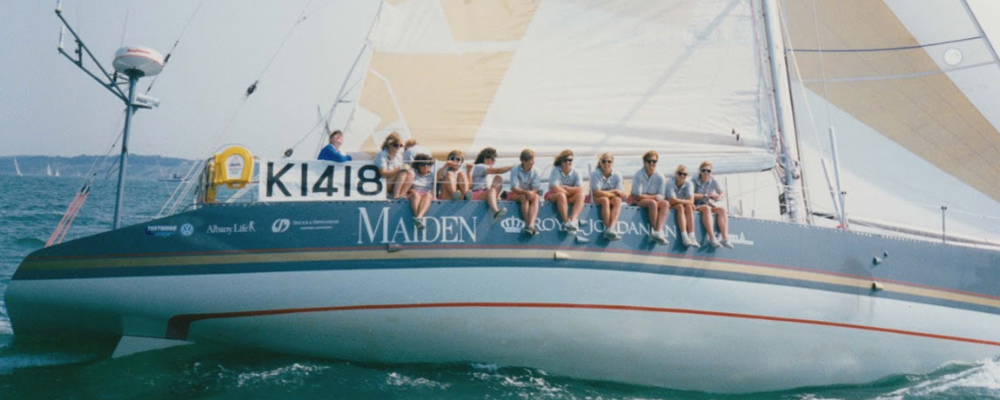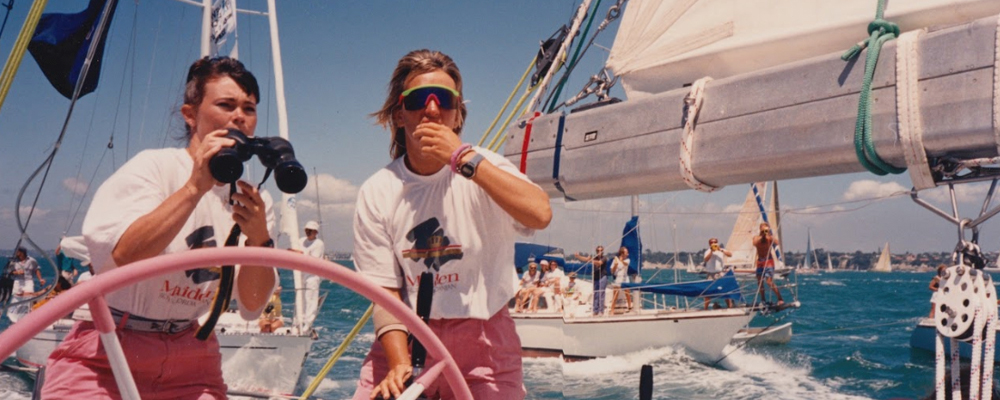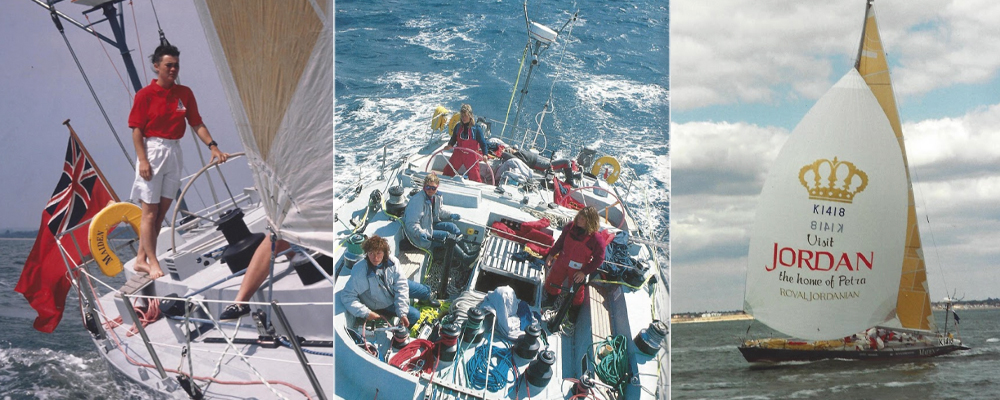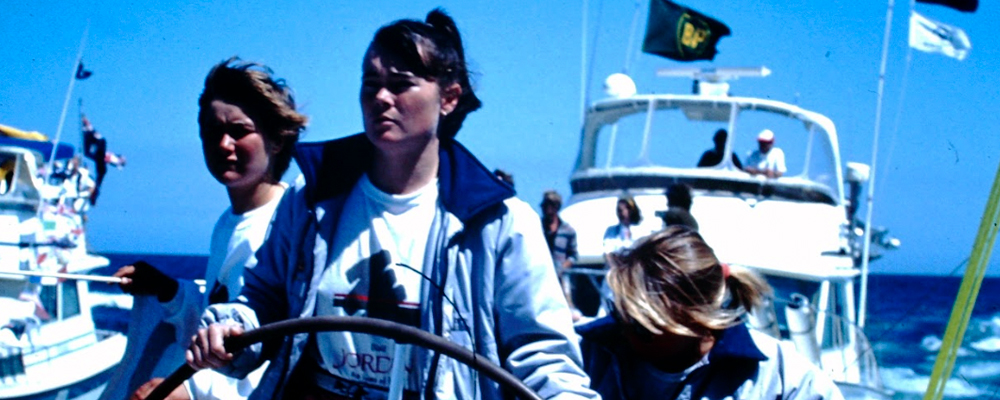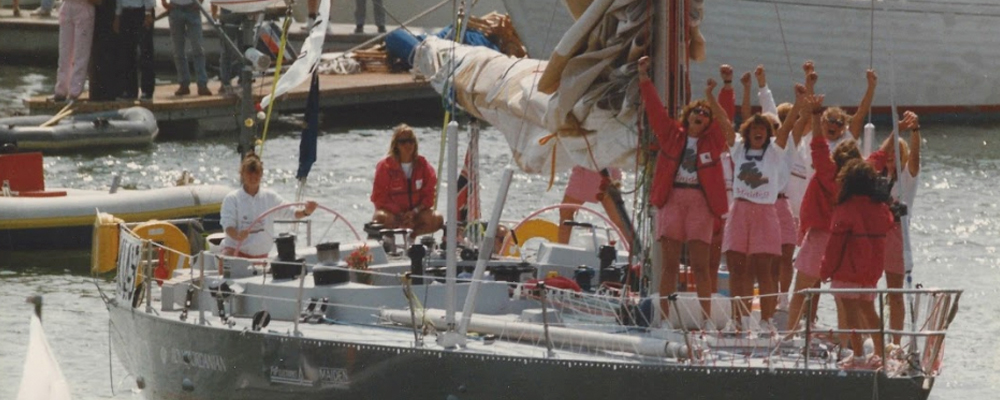‘Maiden’ Recounts a Harrowing Adventure of Women Defying Discrimination at Sea
Alci Rengifo
“Maiden” is a documentary, but it is more exciting and intense than most high budget thrillers. It tells a classic story of danger on the high seas while sharing an inspiring biography that defies imposed gender roles. Tracy Edwards was a born sailor, immediately drawn to the art of commanding a boat, but she faced both economic hurtles and the notion that women can’t sail. It may (and should) sound absurd, but in the late 1980s the idea of women competing in yacht racing could start quite the argument.
In hindsight Edwards was tailor-made for this kind of saga. Losing her father at 10, then living under the shadow of an alcoholic stepfather, Edwards dived deep into anger and rebellion. As she tells it in her interviews for this documentary, she ran away from home at 16 and found her calling while working as a cook and stewardess in various island resorts. Intoxicated by the hard-partying, free spirited world of seamen, Edwards became determined not only to become one of them, but to compete in the Whitbread Round the World Race. The race was the world’s biggest sailing event, where competing teams would circumnavigate the globe. Edwards decided to form a crew and enter the 1989 edition of the race. But before anything else the major struggles were in finding funding and sponsorship, even a viable vessel. Edwards mortgaged her house, bought a beat-up old racing yacht and even found backing from Jordan’s late King Hussein. Once Edwards and her all-woman crew hit the race on the re-christened Maiden, not only did they face the unforgiving elements including brutal waves and stormy nights, but the taunts of their male competitors.
What great luck for director Alex Holmes that the voyage of the Maiden was extensively chronicled with that now vintage device, the video camera. Joanna Gooding, Edwards’ girlhood friend who came along for the epic adventure shot hours of tape, which along with other sources Holmes has fashioned into a tale worthy of Melville or Hemingway. Holmes and Edwards recently spoke with Entertainment Voice about the experience of telling this story for a new generation.
“It’s been an unexpected experience. I didn’t expect it to have as much effect as it has. Thirty years after something… it’s not that we’ve left it in the past… it’s very hard to leave behind,” said Edwards. “When Alex and I met and he suggested this film I didn’t just say ‘oh that’s a great idea,’ I was more like ‘oh ok, I don’t quite know about that.’ I felt a responsibility to the crew because I know there are a couple of crew who have left Maiden in the past.” Now 56, still full of presence, Edwards carries the fire we see in the film, in clips where her hard stare after losing a round of the race reveals a personality determined to pursue a passion. In early moments of the documentary we see a bunch of male sailors drinking and being loud, in the background Edwards looks like she wants to fit in, but they keep her at a distance. “In the interviews I gave up much more than I thought I would. I always thought Maiden was something I kept inside and was going to stay there, but I laid it out. We all did.”
Also appearing in the documentary are Maiden crew members like Dawn Riley, Mikaela Von Kuskull and Marie-Claude Heys, the first mate who was eventually sacked after clashing onboard with Edwards. What is a tale of adventure at sea without the threat of mutiny? “None of us could believe that was us up on the screen,” revealed Edwards. “It was a cathartic experience.”
“The first time I heard Tracy tell the story was when my daughter was in elementary school,” said Holmes. “Fortunately for me, and my daughter, the school had asked Tracy to give a speech to the children. Anybody who meets Tracy gets an immediate sense of her energy and enthusiasm. As she unfolded this story of the battle she had to undertake, to get into the race…I kept thinking, this is a film. The film that I was imagining was a dramatization, because I assumed that there wouldn’t be footage. This was before the era of iPhones when everything gets photographed.” Indeed, there is a striking intimacy to the footage preserved of the Maiden’s voyage from small moments on the boat where we get a sense of what life was like onboard, to grandiose memories of arriving to cheering crowds in Australia. Other moments are quite harrowing, as when a competing ship lost a man who fell overboard or Edwards recalling the sheer rage of falling behind in the race, finding solace in drinking inside her hotel room. When the Maiden sails into the waters of South America the ocean itself becomes a character, as bestial waves lap against the vessel and Edwards recalls how menacing the environment was in that corner of the world. “We wanted to keep it very pure, not get into reconstruction because the footage is so strong. Anything put up against the footage would have looked weak.”
Already a riveting narrative, what then elevates “Maiden” is the subtext, which is how these women embarked on a journey defying the elements and blind human prejudice. It’s quite astounding how condescending even journalists during newscasts are when reporting on the Maiden, and even some of the now older male sailors of the competing ships in their interviews still use words like “chicks.” At one point the women of the Maiden decide to arrive at one destination in bathing suits, to almost taunt public preconceptions. “Women’s sport is still not given the attention and respect it deserves,” said Edwards. “We’ve made some progress in football and rugby, golf, cricket, which are also typically male-dominated worlds. I don’t know how much will there is to change sailing, that’s the thing. I despair quite frankly. But looking at 30 years ago, back when we were looking for sponsorship the answer was quickly ‘no.’ Now we’re looking for money for Maiden to go around again and it’s very different. They know the value of the PR and everything else. There’s a tick box exercise going on.” But Edwards reveals sponsors are still more prone to support a male football team than a women’s sailing crew.
“Maiden” is so absorbing it is easy to forget that we are watching a documentary and not some kind of scripted epic. When the women come ahead in the toughest leg of the race we don’t get the gimmicks of drama, but the testimonials of a real and powerful experience. At the heart of this documentary is the lesson that human endeavors should be seen as that, human. “I remember first hearing Tracy’s story in front of my youngest daughter and feeling shocked,” said Holmes, “to realize, to have it put right in front of me that daughter would still face some of the same obstacles that Tracy faced 35 years ago. That really shocked me, that realization. It made me more determined that this was a story that needs to be told for the next generation. Too little has changed, in all spheres of life.”
For Edwards the lessons of “Maiden” reverberate in a very clear way. “I would say this to anyone thinking about doing anything, don’t think about it, do it.”
“Maiden” opens June 28 in select theaters.

